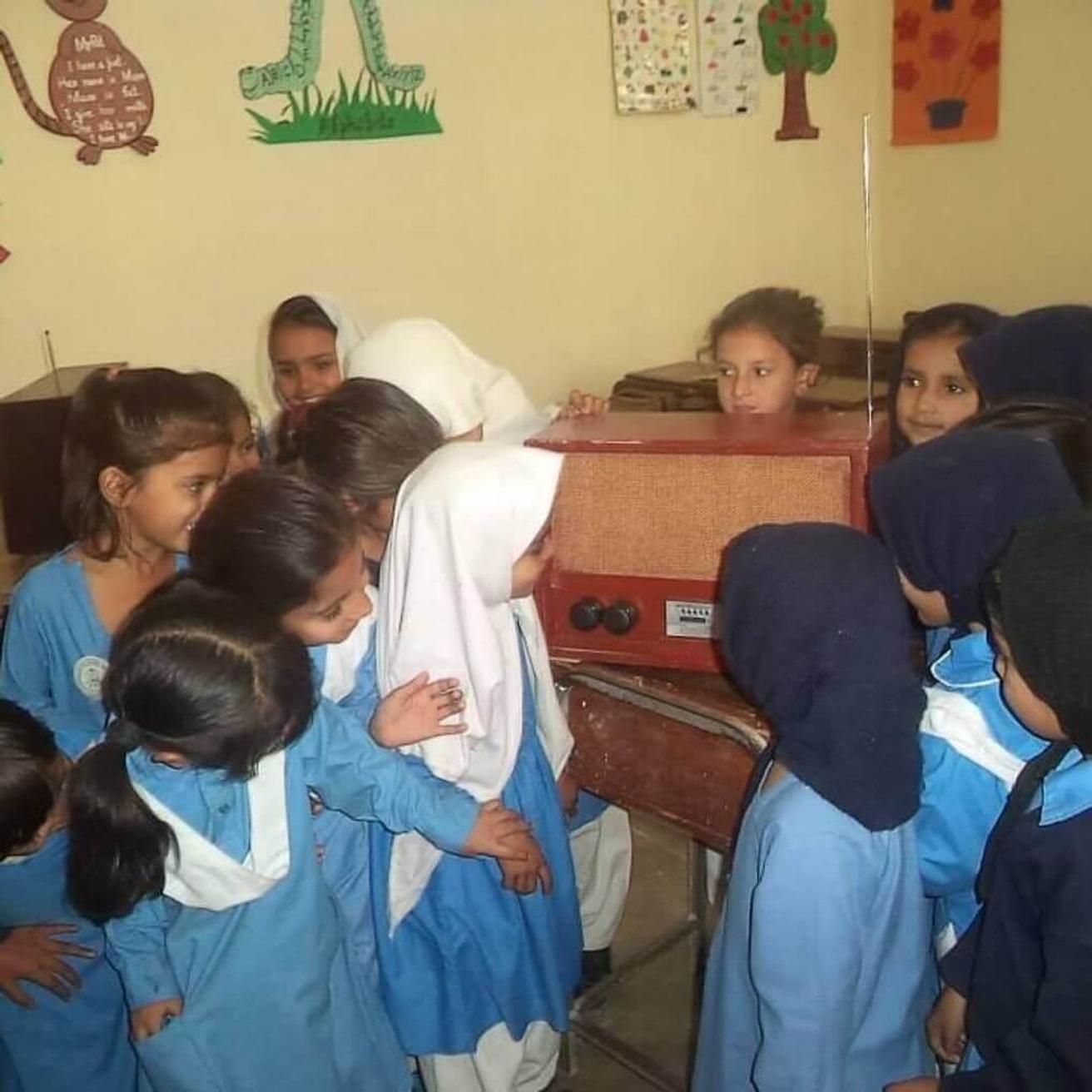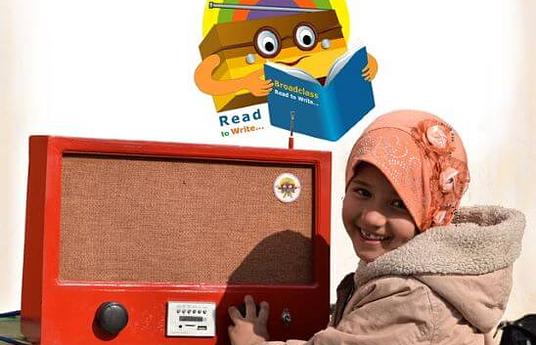The main avenue to escaping poverty is education. However, according to UNESCO, 264 million children around the world still do not even gain their primary school education, let alone their secondary education. This is doubly concerning for today’s world where we are seeing populations forced into becoming highly mobile due to conflict, and therefore out of reach by traditional education systems. This is only set to increase with the threat of the Climate Crisis, with The World Bank predicting that 143 million people will become displaced by 2050.
So how can we make sure that marginalized and displaced children don’t fall through the cracks of our global society?
Pakistani-based Broad Class, a HundrED 2019 innovation, has provided a unique solution to the problem of highly mobile populations – a radio program that can deliver education to marginalized children to stop them from falling behind. More than this, their program has been specially developed as an antidote to the rote learning often employed in schools in Pakistan (and indeed in many locations around the world). We chatted with Fakhira Najib, Mohammad Zubair and Reema Naqvi from Power99 Foundation, the organization behind Broad Class, to find out more about their work.
First things first, what is Broad Class?
Broad Class is a sustainable development project that reduces the educational inequalities of marginalized children in far-flung areas by combining radio with interactive learning and capacity building. Radio is the main tool used for the "Broad Class – Listen to Learn" program, where the radio lessons guide teachers and students through activities, games, and exercises that teach carefully organized knowledge and skills.
How do you use the radio to deliver lessons?
The program broadcasts daily 45 minutes lessons. With the approval of the Federal, Provincial and District Education Departments, and the cooperation of individual school leadership bodies, FM radio is able to broadcast 152 days across the academic year, providing 2 introductory lessons and 75 lessons for each grade level. Due to the accessibility of public broadcast, it makes educational inputs possible to a highly mobile population on a sustained basis. With the geographical, environmental and energy-resource constraints in mind, special wooden radios are locally designed and provided to classrooms, with rechargeable dry batteries, built-in sound system, and USB/memory card options.

How many children is Broad Class reaching?
We are currently reaching 200,000 children, teachers, members of school councils and parents, 60% of whom are girls, across Pakistan. Parents can listen at home, at work or even attend school with their children. The use of low-cost technology has resulted in widespread uptake by schools experiencing difficulties with school attendance and increased teacher engagement in new teaching practice.
Does Broad Class help to improve equity?
Our work improves the quality, equity, and inclusiveness of education, including gains in girls' achievement, closing the rural-urban education gap and increasing access for out-of-school learners. More than 75% of the beneficiaries are from marginalized communities of rural areas.
How is this different from other learning systems that seek to reach marginalized communities and improve equity?
Unlike many distance learning programs, Broad Class is used as a classroom tool to counteract low levels of teacher training, poor achievement among learners and limited resources. The program has demonstrated that it can be used to expand access and increase equity in both formal and non-formal educational settings. It also retains an emphasis on quality improvement through a development strategy and methodology that requires active learning, attention to pedagogy and formative evaluation as an integral part of its design.
How do the audio lessons work?
The lessons guide teachers and students through activities, games, and exercises that teach carefully organized knowledge and skills which are culturally, linguistically and contextually relevant to marginalized populations. During short pauses built into the radio scripts, teachers and students participate in the radio program by reacting verbally and physically to questions and exercises posed by the radio characters.
The program is combined with entertaining, relevant content effective in educating children, families, and communities, improving teaching and instruction quality, and supporting governments' efforts to attain SDGs and other goals. The program builds on local resources and knowledge, and partners with schools in regions with shortages of qualified teachers, school infrastructure and learning materials.

How does it specifically help gender equality?
In order to address issues of gender equity, the program focused on choosing radio characters as female role models that challenged stereotypes. Dialogues and stories throughout the series encourage girls to be confident in their ability to learn and contribute meaningfully to society. For example, one character named Gul is a very outspoken girl who loves learning and is not ashamed to express her ideas even when she is not sure of herself.
Dialogues and stories throughout the series encourage girls to be confident of their ability to learn and contribute meaningfully to society, and female pupils are deliberately chosen to answer certain questions. Additionally, during radio lessons teachers are instructed to select equal numbers of boys and girls to participate in activities. These strategies help to establish a girl-friendly learning environment that encourages girls to complete primary school. This is particularly important for rural areas of Pakistan, where we have a very low girls’ enrolment, retention, and completion at all levels of education.
Why is this important and what are the barriers facing girls in Pakistan?
In Pakistan, gender inequities occur because parents often do not favor sending their girls to schools because of accessibility and cultural barriers. Schools are not close to home, and many parents worry about girls traveling long distances on their own due to safety concerns for their daughters. Other factors that hinder enrolment rates of girls include poverty, cultural constraints, and illiteracy of parents. Also, parents often prefer to have their daughters taught by women.
Enrolment of rural girls is 45% lower than that of urban girls; while for boys the difference is only 10%, showing that the gender gap is an important factor.
How are teachers trained to use Broad Class?
Teachers are trained in using sound pedagogy, interactive teaching techniques, lesson planning, and class management. Workshops provide an intense learning and professional development opportunity for teachers, along with ongoing support which promotes critical capacity, dissemination, and sustainability.
Broad Class has been designed to provide instruction for both teachers and students simultaneously, explicitly taking into account the likelihood of poorly trained or even absent teachers. Teachers in Broad Class classrooms are partners with the radio program, and their role in a lesson includes taking part in whole-group activities that are part of the radio broadcast, working with individual students during the broadcast and leading follow-up activities afterward.
Readers and teachers’ guides are also provided, along with training in active learning pedagogy. Teachers are trained on long-life low-cost teaching techniques and the program develops the skills, information, and self-confidence of female teachers.

There’s an emphasis on including parents in your work, why do you think this is important?
Schools in Pakistan function in isolation, occasionally explicitly forbidding parental and community involvement. This has culminated in a situation where we are now faced with a pitifully low survival rate of only 66% at the primary school level. On the other hand, families also do not realize that their participation can enrich the educational experience of their child.
Family and community participation fosters increased awareness which supports growth and educational sustainability. Through the medium of radio, the approach reaches a shadow audience of community members, whose understanding of their children’s education is enhanced, enabling them to better support their children and engage in a dialogue around improving education, especially for girls. Depending on the literacy level of parents, they too can learn by listening to Broad Class lessons and from their children.
All our efforts are needed to involve the community in schools. There is a need to raise awareness on the importance of educating girls through extensive liaison with the community, giving special care and respect to local cultural norms and to adhere to them while in the area. Communities have benefited from job and business opportunities, such as the making of materials, books, and radio sets.
What’s next for Broadclass?
Our goal is to increase the reach of our Broad Class methodology across communities in different provinces to turn it into an indispensable student-centered learning tool.
Answers provided by Fakhira Najib, Mohammad Zubair, and Reema Naqvi. Some answers have been edited for clarity.
Fakhira Najib is Chief Executive at POWER99 Foundation. An educationist by profession, who has conceptualized and developed various radio program on education such as weekly program “BACHOON KA 99”, “STORY-TELLING TIME”, “Knowledge is Fun” and “Broad Class – Listen to Learn” programs for improving literacy, numeracy and healthy habits in children in public and non-formal schools in Pakistan.
Mr. Mohammad Zubair is a Program Manager at POWER99 Foundation and has more than 28 years experience in the development sector including 18 years in the overall implementation of education projects in schools.
Reema Naqvi is Project Officer at POWER99 Foundation with more than 3 years experience in the development sector.

